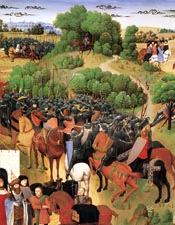La Chanson de Roland (The Song of Roland)
, translated by Kline, A. S. (contact-email)
‘La Chanson de Roland’, or ‘The Song of Roland’, an 11th-century chanson de geste (a literary form that flourished between the 11th and 16th centuries in Europe, celebrating legendary deeds) relates the tale of the Frankish warrior Roland at the Battle of Roncevaux (or Roncesvalles) Pass, in AD778, during the reign of the Emperor Charlemagne, King of France. The poem, the oldest major work of French literature extant, composed in Old French, is thought to have been drafted around 1040AD and subsequently enhanced during the period up to 1115AD. The historical battle was an ambush laid by the Basques against Charlemagne’s forces, in retaliation for the destruction of their capital Pamplona, however the poem, fictitiously, presents the encounter as a battle against the Muslim conquerors of Spain who, as the poem begins, have been defeated everywhere apart from Zaragoza. Roland was adopted in the 19th century as a French national hero, and this chanson de geste, in which he appears, as the French national epic. The major extant manuscript of the Song of Roland in Old French, dating between 1129AD and 1165AD and written in Anglo-Norman, is held at the Bodleian Library (MS Digby 23), Oxford, England.

Kline, A. S.
Support Open-Access:
Your contribution keeps our classical translations available to all. Every dollar helps support classics education and funds the expansion of our catalogue. Value what we do? Donate now.
File Downloads:
© Copyright, All Rights Reserved. This work may be freely reproduced, stored and transmitted, electronically or otherwise, for any non-commercial purpose. Conditions and Exceptions apply.